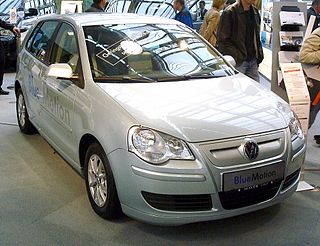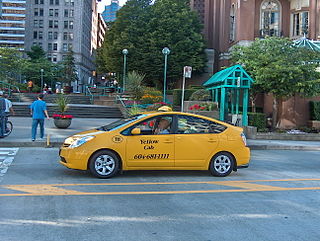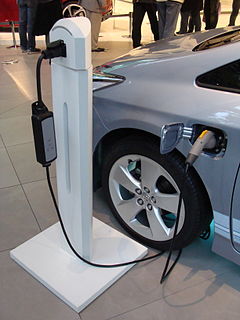
Volkswagen is a German motor vehicle manufacturer headquartered in Wolfsburg, Lower Saxony, Germany. Founded in 1937 by the German Labour Front, known for their iconic Beetle, it is the flagship brand of the Volkswagen Group, the largest car maker by worldwide sales in 2016 and 2017. The group's biggest market is in China, which delivers 40% of its sales and profits. The German term Volk translates to "people", thus Volkswagen translates to "people's car".

The Volkswagen Golf is a compact car/small family car (C-segment) produced by the German automotive manufacturer Volkswagen since 1974, marketed worldwide across eight generations, in various body configurations and under various nameplates – including as the Volkswagen Rabbit in the United States and Canada, and as the Volkswagen Caribe in Mexico (Mk1).

The Volkswagen Jetta is a compact car/small family car manufactured and marketed by Volkswagen since 1979. Positioned to fill a sedan niche above the firm's Golf hatchback, it has been marketed over seven generations, variously as the Atlantic, Vento, Bora, City Jetta, Jetta City, GLI, Jetta, Clasico, and Sagitar.
BlueTEC is Mercedes-Benz Group's marketing name for engines equipped with advanced NOx reducing technology for vehicle emissions control in diesel-powered vehicles. The technology in BlueTec vehicles includes a selective catalytic reduction (SCR) system that uses diesel exhaust fluid, and a system of NOx adsorbers the automaker calls DeNOx, which uses an oxidizing catalytic converter and diesel particulate filter combined with other NOx reducing systems.

The Smart Fortwo is a rear-engine, rear-wheel-drive, 2-passenger hatchback ultramini manufactured and marketed by the Smart division of the German multinational Daimler AG. Introduced in 1998, it is now in its third generation.

The Green Car of the Year is a Car of the Year award from the Green Car Journal. The winner is selected by an 11-member panel comprising automotive and environmental experts. Invited jurors have included Mario Andretti; Carroll Shelby, Jay Leno, Carl Pope, Christopher Flavin, Jonathan Lash and Jean-Michel Cousteau.

A hybrid electric vehicle (HEV) is a type of hybrid vehicle that combines a conventional internal combustion engine (ICE) system with an electric propulsion system. The presence of the electric powertrain is intended to achieve either better fuel economy than a conventional vehicle or better performance. There is a variety of HEV types and the degree to which each function as an electric vehicle (EV) also varies. The most common form of HEV is the hybrid electric car, although hybrid electric trucks, buses, boats and aircraft also exist.

An alternative fuel vehicle is a motor vehicle that runs on alternative fuel rather than traditional petroleum fuels. The term also refers to any technology powering an engine that does not solely involve petroleum. Because of a combination of factors, such as environmental concerns, high oil-prices and the potential for peak oil, development of cleaner alternative fuels and advanced power systems for vehicles has become a high priority for many governments and vehicle manufacturers around the world.
The Vehicle Efficiency Incentive (VEI) was introduced in the 2007 Canadian federal government budget, aimed at promoting fuel-efficient vehicles. The VEI took effect on March 20, 2007, and it included a performance-based rebate program offering up to $2,000 for the purchase of a new fuel-efficient vehicle, a neutral treatment of a broad range of vehicles with average fuel efficiency that were widely purchased by Canadians, and a new Green Levy on fuel-inefficient vehicles.

BlueMotion is a tradename for certain car models from the Volkswagen Group with an emphasis on higher fuel efficiency.
The U.S. Energy Policy Act of 2005 established a federal income tax credit of up to $3,400 for the purchase of new hybrid vehicles, purchased or placed into service after December 31, 2005. Vehicles purchased after December 31, 2010 are not eligible for this credit. The law limited the tax credits to the first 60,000 eligible vehicles per carmaker, meaning that credits for popular models will be phase out before the tax break's scheduled expiration date. Note these are credits — dollar for dollar tax savings — not merely deductions. The tax credit is to be phased out two calendar quarters after the manufacturer reaches 60,000 new cars sold in the following manner: it will be reduced to 50% if delivered in either the third or fourth quarter after the threshold is reached, to 25% in the fifth and sixth quarters, and 0% thereafter. The Internal Revenue Service is responsible for certifying that certain passenger autos and light trucks qualify for the credit and the amount of the credit.
A scrappage program is a government budget programme to promote the replacement of old vehicles with modern vehicles. Scrappage programmes generally have the dual aim of stimulating the automobile industry and removing inefficient, more polluting vehicles from the road. Many European countries have introduced large-scale scrappage programmes as an economic stimulus to increase market demand in the industrial sector during the global recession that began in 2008.

Hybrid taxi or hybrid electric taxi is a taxicab service provided with a hybrid electric car (HEV), which combines a conventional internal combustion engine propulsion system with an electric propulsion system.
Smart is a German automotive brand. Smart Automobile Co., Ltd. is a joint venture established by Mercedes-Benz AG and Zhejiang Geely Holding Group in 2019 and aimed at producing Smart-badged cars in China to be marketed globally. The venture is headquartered in Ningbo. It produces small battery electric vehicles in their manufacturing plant in China, while previously the brand was known to produce microcars and subcompacts, primarily the Fortwo and Forfour, at the Smartville in Hambach, Moselle, France and in the Revoz plant. Its distribution, marketing and aftersales activities in Europe are currently handled by smart Europe GmbH which is headquartered in Stuttgart, Germany.

The Toyota Prius Plug-in Hybrid is a plug-in hybrid liftback manufactured by Toyota. The first-generation model was produced from 2012 to 2016. The second-generation model has been produced since 2016.
Many governments offer a hybrid tax credit or hybrid tax rebate as a financial incentive for consumers to purchase a hybrid vehicle.

Government incentives for plug-in electric vehicles have been established around the world to support policy-driven adoption of plug-in electric vehicles. These incentives mainly take the form of purchase rebates, tax exemptions and tax credits, and additional perks that range from access to bus lanes to waivers on fees. The amount of the financial incentives may depend on vehicle battery size or all-electric range. Often hybrid electric vehicles are included. Some countries extend the benefits to fuel cell vehicles, and electric vehicle conversions.

The stock of plug-in electric passenger cars in Canada in use totaled 141,060 units at the end of 2019, consisting of 78,680 all-electric cars and 62,380 plug-in hybrids. Sales totaled 50,960 units in 2019.

The Volkswagen Jetta is a compact car, the fifth generation of the Volkswagen Jetta and the successor to the Volkswagen Bora which was manufactured by Volkswagen between 2005 and 2010, and up to 2012 in China. It is a three-box sedan derivative of the Golf Mk5. It was marketed as the Volkswagen Bora in Mexico and Colombia, Volkswagen Vento in Argentina, Chile and Uruguay, and Volkswagen Sagitar in China.

The Volkswagen Jetta (A6) is a compact car, the sixth generation of the Volkswagen Jetta and the successor to the Jetta (A5). Known as the NCS during its development, it was released in 2010 and was phased out since 2018 to make way for the Jetta (A7). The A6 Jetta is notable for leaving the premium positioning in the compact car segment, a strategy employed by Volkswagen to increase volume in the North American market. It also marked the departure from being a sedan derivative of the Golf, opting for a dedicated bodywork instead.
















